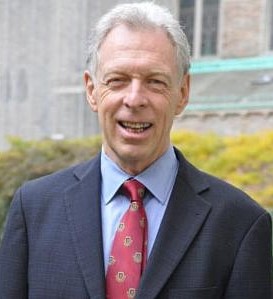ph: (646) 770-5791
allan
In the News

Fostering ‘Helper’s High’
Mr. Luks, director of Fordham University’s Center for Nonprofit Leadership, has worked in the nonprofit sector for more than 30 years. He has learned that the most important lesson he can teach aspiring leaders is to have a public conscience
Nonprofit groups look more and more like businesses today, but they should be about solving everyday problems, he says. Universities "are at the heart of turning this around." In the 1980s, he remembers, he set out to solve everyday problems related to the risks of alcohol consumption. While working for the Alcoholism Council of New York, for example, he spent years organizing and lobbying for mandatory signs to warn pregnant women of the health risks of drinking.
 His motivation for much of his work? The "Helper’s High" — a term he coined while doing research on the emotional and physical benefits reported by those who directly help others.
His motivation for much of his work? The "Helper’s High" — a term he coined while doing research on the emotional and physical benefits reported by those who directly help others.
About two years ago, Mr. Luks established Fordham’s master’s-degree program in nonprofit leadership. It is an unusual joint effort between the graduate schools of social service and business. Each course links the business skills needed to run a nonprofit organization with ideas about how to advance the group’s mission. Among other skills, students learn how to create a strategic five-year plan for a project and how to budget program funds to build support for an effort.
By August, he anticipates, about 100 students will have graduated from the program. It is geared toward people with experience in social services, so students’ average age is around 38.
Each student gets a mentor who holds a leadership role in a nonprofit group in the greater New York area. Mr. Luks knows a lot about mentoring, having been executive director of Big Brothers Big Sisters of New York City from 1990 to 2008.
More programs in nonprofit leadership are popping up across the country. Fordham’s program tries to distinguish itself by emphasizing social justice throughout the curriculum.
"We want students to look in the mirror," Mr. Luks says. "And say, ‘How do you want to be remembered? Will you remember yourself by your budget?’"
— Corinne Ruff

Senior volunteers can add expertise to policy
By Allan Luks
At 74, I carry a final mirror. It keeps asking me that last question: What is my final judgment of myself?
I see a face with gray hair, dark spots and wrinkles, and wonder: After four decades of advocating for social changes — helping the ill and poor — does my mirror still see me as a force for change or someone who should walk off to the sidelines with so many other seniors?
Looking into that final mirror, I see myself as the director of a graduate-school program at Fordham University, training nonprofit leaders to make society better. Nice. But I want the mirror to still see me as an active player in the field of policy change, and not just as a cheerleader on the sidelines.
I have an idea of how to best use the 40-million-person army of seniors older than 65 to put us on center stage: Use us as volunteers in the offices of elected and appointed officials to evaluate social-change proposals.
Lawmakers' offices throughout the U.S. receive piles of proposed policy changes — from small community initiatives to larger statewide and even national proposals — that never get a chance to be discussed or voted on. They die on that pile, outlasting the energy of their supporters, who grow frustrated with the inaction of elected officials and give up the fight. Officials defend themselves by moaning about insufficient staff, budgets and time to do meaningful reviews, but the situation doesn't change.
But seniors can make this change happen. The resource to greatly reduce this social-change backlog can be found across the country in senior volunteers, who would bring many decades of work and life experience to the task of analyzing proposals that are received by public offices. Seniors are a force that can boost the public's low opinion of officials, whom society believes only jump into action — if at all — when the proposal is backed or challenged by powerful lobbyists.
Seniors also bring more maturity to their volunteer work, helping them to rise above the divisive and partisan politics that plague our political process today. They recognize that no one person or group has all the answers, and know they have to act quickly. These attributes can spread to other public offices where seniors would volunteer, and foster a new era of cooperation among policy makers.
Preventing the fastest-growing part of our population from playing a vital role in society doesn't make sense. A simple, cost-effective and highly beneficial volunteer program that puts them front-and-center of the action in our political system does.
I invite appointed and elected officials to contact me, and seniors in their communities, to start the conversation. I wait armed, as are other seniors, with years of professional and life experience and an eagerness to use them.
Allan Luks interview with Marc Middleton and Bill Shafer from GrowingBolder radio show (Click to listen)
New York Nonprofit Press Article

Allan Luks interview with Denver Frederick
from WOR Radio (Click to listen)


The Chronicle of Philanthropy article

Allan Luks interview with Budd Mishkin
from “One on 1” NY1 News (Click to view)
Fordham University "Inside Fordham Online" article


A selection of articles written by Allan Luks.

HOME ABOUT ALLAN HELPER'S HIGH CHANGE THE WORLD IN THE NEWS CONTACT BLOG
Copyright 2010 Allan Luks. All rights reserved.
ph: (646) 770-5791
allan



